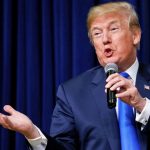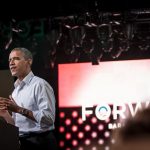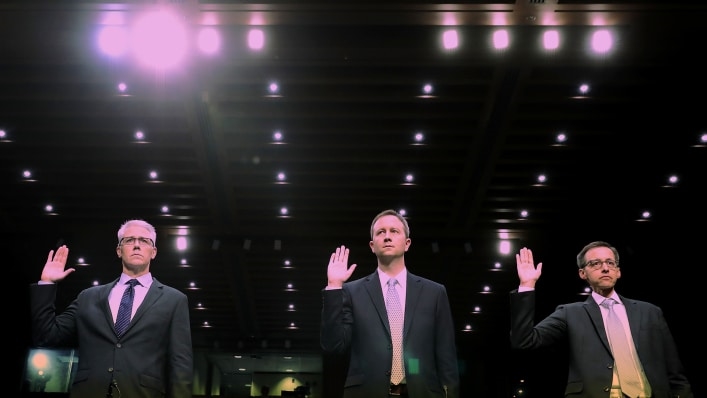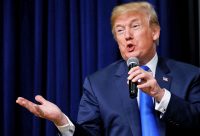Senators Grill Facebook, Twitter, & Google On Fake News: “Your Power Scares Me”
Today, members of the Senate Judiciary Committee grilled executives from Facebook, Google, and Twitter about the deluge of Kremlin-backed propaganda spreading across their online networks.
The long-anticipated hearing gave senators an opportunity not only to press technology companies on the ways their platforms were manipulated during the 2016 U.S. presidential election, but also to force Facebook, Google, and Twitter to address how they profited from ads featuring state-sponsored disinformation–as well as what tangible impacts their massive digital reach has had on society.
“Your power sometimes scares me,” said Republican Senator John Kennedy, calling the tech titans’ influence “breathtaking.”
In advance of their testimony, the tech giants released disturbing data from the last campaign cycle. Facebook found that Russian operatives had reached 126 million users on its social network through inflammatory ads and posts. YouTube reported that more than 1,000 videos had been uploaded to the Google-owned video network. And Twitter disclosed that, between September and mid-November of 2016, Russian-connected bots generated approximately 288 million impressions.
This content, often in the form of disinformation and fake news, was intended to sow chaos and influence the election’s outcome, and today’s hearing centered on whether tech companies are capable of stopping the increasing flood of extremist content, or whether government intervention or regulation is necessary.
“We have to be on guard,” Senator Lindsey Graham said, for what he called “the national security challenge of the 21st century.”
Facebook Receives Drubbing On Its About-Face, Political Ads
Although representatives for Google and Twitter were present, Facebook general counsel Colin Stretch received the most pressure from senators at today’s hearing–perhaps because the world’s largest social network has pulled such a dramatic about-face since CEO Mark Zuckerberg infamously said it was “pretty crazy” to suggest that Facebook had somehow influenced the 2016 presidential election.
Today, however, Stretch sang a different tune.
“When it comes to the 2016 election, we take what happened on Facebook very seriously,” Stretch said, calling the “foreign interference” they saw “reprehensible.”
In other words, mea culpa.
In two of the most dramatic exchanges of the day, Sen. Kennedy and Democratic Senator Al Franken, in a rare showing of bipartisan agreement, took Stretch to task regarding how well Facebook can police its own platform. Kennedy said Facebook was living in “la la land” if he thought Facebook could monitor all 5 million advertisers on its platform, and pushed Stretch on whether he could say for certain that other foreign states didn’t try to influence the election.
“Did China run ads in the last election cycle? Did Turkmenistan? How about North Korea?” Kennedy asked.
“Not that I’m aware,” Stretch repeated several times in response.
Franken later questioned Stretch on whether Facebook would commit to not accepting ads paid for in Russian rubles or even the North Korean won. When Stretch couldn’t commit to that proposition, Franken groused back, “You put billions of data points together all the time! You can’t put together rubles with a political ad and say, ‘Hmm! Those two data points spell out something bad.’”
Expect “paid-for-by-rubles ads” to be a political talking point across the aisle going forward.
The drubbing continued throughout the day, with Facebook receiving what seemed to be a disproportionate amount of Senate queries. At one point, Senator Patrick Leahy of Vermont brought out a large poster displaying a number of disinformation printouts that apparently appeared on Facebook just today.
“I hear a lot of Johnny-come-latelies,” Leahy said, chastising the tech companies for being slow to respond to these problems.
No, We’re Not Media Companies!
“Are you a media company?” Sen. Kennedy asked Google law enforcement and information security director Richard Salgado, who barely uttered that the company was actually a “technology platform” before Kennedy shot back, “That’s what I thought you’d say.”
It was a crucial question with a predictable answer. For years, technology companies have defined themselves as platforms through which data flows–mere conduits and traffickers of information that the tech companies mostly bear no or little responsibility for, beyond (sometimes inconsistently) removing content that violates their self-imposed community standards. The content on their platforms, the Valley giants argue, is user-generated, a form of online free expression.
So of course, when asked whether Google is akin to a newspaper–an outlet that can face severe repercussions for what it prints and publishes, particularly if the content is fake or proven false–Salgado responded, “We are not a newspaper–we are a platform . . . [that collects information] that can include news from sources such as newspapers.” To which Kennedy replied, “Isn’t that what newspapers do?”
It’s increasingly apparent that critics are tired of technology companies believing they can have their cake and eat it too. At a later point in the hearing, Sen. Graham asked Stretch, Salgado, and Twitter general counsel Sean Edgett whether their companies were in the “content business.” All said no.
Is Regulation Inevitable?
Throughout the hearing, the three representatives of Facebook, Google, and Twitter maintained the position that they–not the government–were most fit to self-police their platforms. (Eric Schmidt, executive chairman of Google’s parent company Alphabet, argued a similar point in a recent interview with Fast Company.)
When Senator Amy Klobuchar asked whether these companies would support a newly proposed bipartisan bill that would require them to make more disclosures on political ads, the group demurred, indicating that they were developing more internal procedures on how to address the problem of disinformation, fake news, and extremist content.
“Just to be clear, there wouldn’t be an outside enforcer with any of your policies, right?” Klobuchar pressed. When nobody responded, she said again, “Okay, can someone answer?” Finally all three affirmed her statement.
Sen. Sheldon Whitehouse, perhaps extending an olive branch, asked if the technology companies could produce appropriate success metrics to prove that the government wouldn’t “need to regulate in this space.” But he also reiterated that the connotations of this matter were significant.
“I urge you to stop making the argument that this isn’t a big deal,” he said, in apparent reference to how some of the companies seemed to be downplaying the influence extremist content has had on the public and American society. Facebook, for example, in its disclosures, pointed out that Russia-linked propaganda affected just 0.004% of News Feed content.
Responded Facebook’s Stretch, “I don’t want to suggest in any way that this isn’t a big deal.”
Facebook, Google, and Twitter will next appear before Senate Intelligence Committee tomorrow.
Fast Company , Read Full Story
(45)














